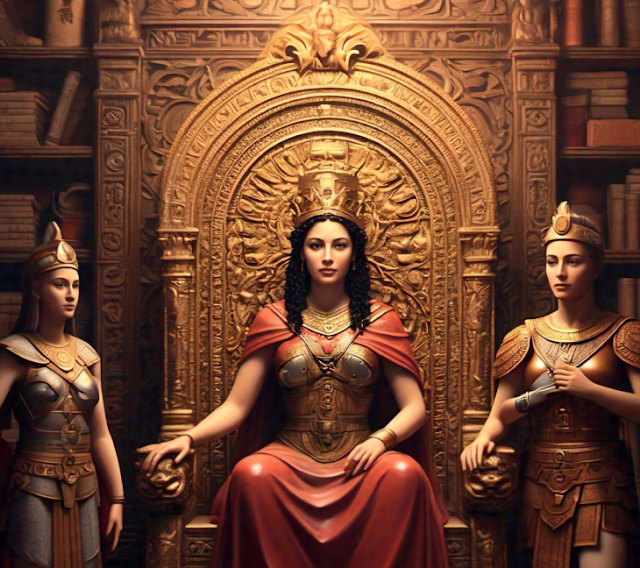
The history of women in political power in ancient
civilizations reveals the often overlooked yet significant roles that women
played in shaping the course of history.
While many cultures were patriarchal and traditionally
relegated women to domestic roles, there were notable exceptions where women
rose to positions of authority, influence, and power.
These women not only defied the norms of their time but also
left legacies that would shape future political landscapes.
In this article, we’ll list and discuss the history of women
in political power in ancient civilizations, focusing on the lives of several
remarkable women who defied the boundaries set for them.
The Role of Women in Ancient Societies
In many ancient civilizations, political power was
predominantly in the hands of men, but this does not mean that women were
entirely excluded from politics.
Some societies had structures in place that allowed women to
exercise authority, although these roles often came with limitations.
RELATED: The Role of Political Movements in Shaping the 20th-Century Political Landscape
Women who held power were often queens, empresses, or
regents, and their authority was frequently tied to their familial
ties—particularly as daughters, wives, or mothers of kings and emperors.
Despite the limitations, these women managed to wield
substantial influence. The history of women in political power in ancient
civilizations provides a fascinating glimpse into how these women navigated the
complex intersections of gender, power, and authority.
Let’s take a closer look
at some of the most powerful women from the ancient world who shaped the
political scenes of their respective civilizations.
1. Cleopatra VII of Egypt
Cleopatra VII is perhaps the most famous woman in political
power from the ancient world. As the last active ruler of the Ptolemaic Kingdom
of Egypt, Cleopatra was a highly intelligent and charismatic leader. Born in 69
BC, she became queen at the age of 18, following the death of her father.
Cleopatra’s political acumen was evident in her ability to navigate the complex
political alliances of her time, particularly with the Roman Empire. She was
known for her relationships with Julius Caesar and Mark Antony, which were as
much about political strategy as they were about personal matters.
Cleopatra was not only a lover and political ally but also
an effective ruler who sought to preserve Egypt’s independence in a time when
Rome was expanding its reach across the Mediterranean. Her reign was marked by
her efforts to revive Egypt’s economy, culture, and military strength.
RELATED: Impact of the Cold War on Global Political Alliances and Conflicts
Cleopatra’s legacy in the history of women in political power in ancient
civilizations remains influential, not only for her political maneuvers but
also for her intellectual and cultural contributions to Egypt.
2. Queen Hatshepsut of Egypt
Another powerful woman in Egyptian history was Queen
Hatshepsut, who ruled as pharaoh from 1479 to 1458 BC.
Hatshepsut was one of
the few female pharaohs in ancient Egypt and is often regarded as one of
Egypt’s most successful rulers.
Her reign brought prosperity to Egypt, as she
established trade networks, expanded the empire’s borders, and initiated
massive building projects, including the famous Temple of Deir el-Bahari.
What makes Hatshepsut’s reign particularly notable is that
she initially ruled as regent for her young stepson, Thutmose III, but
eventually declared herself pharaoh.
RELATED: South Korean Lawmakers Have Impeached President Yoon
To solidify her legitimacy, she adopted
male dress and royal regalia, even portraying herself with a false beard in
statues.
Hatshepsut’s ability to navigate the politics of her time and her
strategic decision-making demonstrate the resilience and leadership of women in
ancient political spheres.
3. Queen Elizabeth I of England
Although not from the ancient world, Queen Elizabeth I’s
rule in the late 16th century is an important part of the broader history of
women in political power.
She was the daughter of King Henry VIII and Anne
Boleyn and ascended to the throne in 1558.
Elizabeth I is remembered as one of
the greatest monarchs in English history, having led the country through a
period of political and religious upheaval.
RELATED: The Role of Pan-Africanism in African Independence Movements
Her reign, known as the Elizabethan
Era, was marked by economic growth, the defeat of the Spanish Armada, and the
flourishing of English culture.
Elizabeth I’s reign was a clear example of how a woman could
wield significant political power, even in a patriarchal society. She ruled
without a husband, earning her the nickname “The Virgin Queen.”
Despite the
challenges posed by being a woman in power during this period, Elizabeth I
proved that women could be formidable leaders, successfully navigating
diplomacy, war, and political intrigue to secure England’s position as a global
power.
4. The Empress Wu Zetian of China
In ancient China, the Empress Wu Zetian stands out as one of
the most powerful women in history.
She rose from being a concubine of Emperor
Taizong to eventually becoming the only female emperor in Chinese history.
Wu
Zetian’s ascent to power was marked by political maneuvering, as she first
ruled as regent for her son, Emperor Zhongzong, before declaring herself
emperor in 690 AD.
RELATED: Impact of Electoral Reform on Voter Turnout
Wu Zetian’s reign is remembered for her ability to
consolidate power, promote talented individuals regardless of their social
status, and implement reforms that strengthened China’s economy and military.
She was also known for her strong political instincts and for maintaining the
stability of the Tang Dynasty during her time as ruler. Wu Zetian’s legacy is a
testament to the significant role that women could play in governance, even in
ancient patriarchal societies.
5. Queen Victoria of the United Kingdom
Though Queen Victoria ruled much later than the other
figures mentioned, her reign from 1837 to 1901 is an important part of the
history of women in political power.
Queen Victoria ruled during a time when
monarchies were still powerful, and her influence extended far beyond the
British Isles.
Under her leadership, the British Empire reached its height,
controlling vast territories across Africa, Asia, and the Americas.
RELATED: Minor Political Figures of the 20th Century
Victoria’s leadership was unique in that she symbolized a
period of relative stability and expansion for the British Empire.
Despite
being a constitutional monarch with limited political power, she exerted
significant influence over British politics and society.
Her reign helped shape
the role of women in political power for future generations, proving that women
could lead in an era dominated by men.
A Word From Politicalvista
The history of women in political power in ancient
civilizations is rich with examples of women who defied the traditional roles
of their time and made lasting contributions to the political, cultural, and
economic landscapes of their societies.
From Cleopatra to Wu Zetian, these
women proved that political power was not reserved for men alone and that women
could lead, govern, and influence the course of history.
RELATED: Debbie Mucarsel-Powell Victory Speech – Aug. 20, 2024
As we reflect on these remarkable women, we are reminded of
the importance of breaking through societal barriers and striving for equality
in all aspects of life, including politics.
The history of women in political
power in ancient civilizations is not just about individual women; it is a
reflection of the potential for all women to make an impact in shaping the
future of their nations and the world.

Be the first to comment